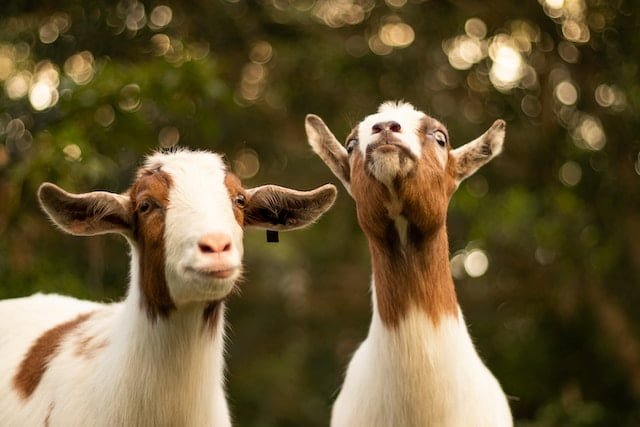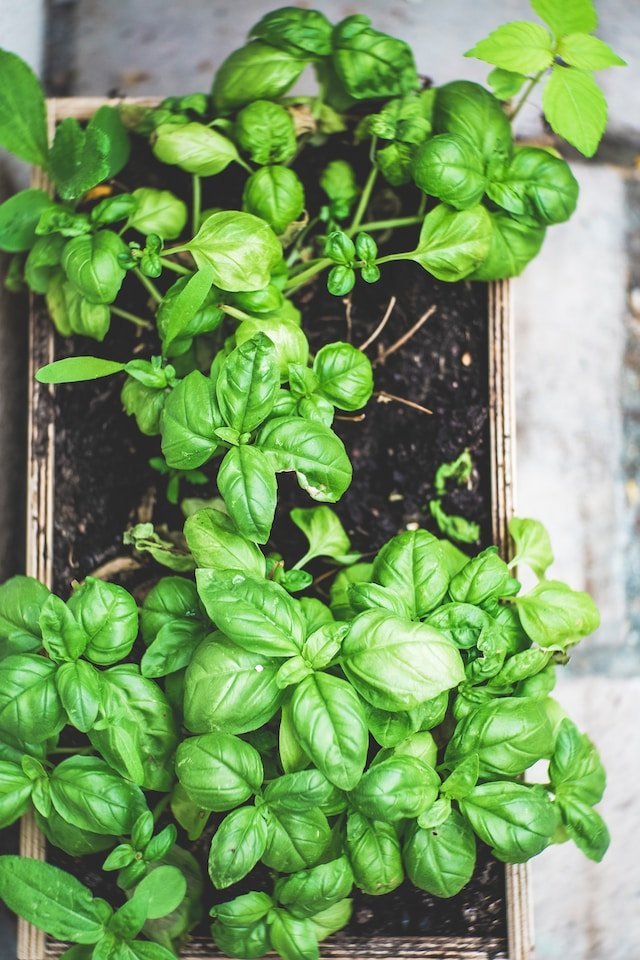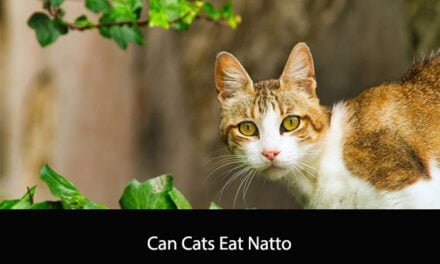As a goat owner, I am always looking for new foods to feed my goats. Basil is a popular herb used in many dishes and is often grown in home gardens. But can goats eat basil? The answer is yes, goats can eat basil, but it should be given in moderation.
Basil is a safe and nutritious herb for goats to consume. It contains vitamins A, C, and K, as well as minerals such as calcium and iron. However, too much basil can cause digestive issues in goats, such as bloating and diarrhea. It is important to introduce basil slowly into their diet and monitor their reactions.

If you are considering feeding your goats basil, it is important to note that not all herbs and plants are safe for them to consume. Some plants can be toxic and even deadly to goats. It is always best to do your research and consult with a veterinarian before introducing any new food into your goat’s diet.
Understanding Goat Dietary Needs
As someone who has raised goats for many years, I understand the importance of providing them with a balanced diet. Goats are herbivores and require a diet that is high in fiber, vitamins, and minerals. They also need access to clean water at all times.
When it comes to feeding goats, it’s important to keep in mind that their dietary needs can vary depending on their age, weight, and activity level. For example, a lactating doe will require more food than a non-lactating doe. It’s important to monitor your goats’ weight and adjust their diet accordingly.
In general, a goat’s diet should consist of the following:
- Hay: Goats should have access to high-quality hay at all times. Timothy, orchard grass, and alfalfa are all good options.
- Grain: While goats don’t require grain, it can be a good source of energy and protein. However, it should be fed in moderation and only to goats who need it (such as lactating does or growing kids).
- Vegetables and fruits: Goats can eat a variety of vegetables and fruits, including carrots, pumpkins, and apples. However, these should be fed in moderation and not as a substitute for hay.
- Minerals: Goats require a variety of minerals, including calcium, phosphorus, and copper. A mineral block or loose minerals should be provided at all times.
- Water: Clean, fresh water should be available to goats at all times.
It’s also important to note that goats are browsers and enjoy eating a variety of plants. However, not all plants are safe for goats to eat. It’s important to research any new plants before feeding them to your goats to ensure they are safe.
In conclusion, understanding a goat’s dietary needs is essential for their health and well-being. By providing them with a balanced diet that includes hay, grain (if needed), vegetables and fruits (in moderation), minerals, and water, you can help ensure that your goats are healthy and happy.
Basil as Part of Goat Diet
As a goat owner, I am always looking for new and healthy food options to add to my goats’ diet. Basil is a flavorful herb that is commonly used in cooking, but can it be beneficial for goats too? Let’s take a closer look at the nutritional value of basil and its potential health benefits for goats.
Nutritional Value of Basil
Basil is a good source of vitamins and minerals that are important for goats’ health. According to the USDA, 100 grams of fresh basil contains:
- 27 calories
- 2.65 grams of protein
- 0.64 grams of fat
- 2.65 grams of fiber
- 3.15 grams of sugar
- 56 milligrams of calcium
- 1.64 milligrams of iron
- 295 milligrams of potassium
- 18 milligrams of vitamin C
- 0.08 milligrams of vitamin B6
While basil is not a significant source of any one nutrient, it does provide a variety of vitamins and minerals that can support goats’ overall health.
Potential Health Benefits for Goats
In addition to its nutritional value, basil may offer some health benefits for goats. Some potential benefits of feeding basil to goats include:
- Anti-inflammatory properties: Basil contains compounds that have anti-inflammatory effects. This may be beneficial for goats with inflammatory conditions such as arthritis.
- Digestive support: Basil contains fiber and other compounds that can support digestive health in goats. It may also have antibacterial properties that can help prevent digestive infections.
- Respiratory support: Basil has traditionally been used to support respiratory health in humans, and it may have similar benefits for goats. Some goat owners use basil to help alleviate symptoms of respiratory infections or allergies.
While there is limited research on the specific benefits of feeding basil to goats, these potential benefits suggest that it may be a valuable addition to their diet.
In conclusion, basil can be a healthy and flavorful addition to goats’ diet. Its nutritional value and potential health benefits make it worth considering as a supplement to their regular feed. As always, it’s important to introduce new foods gradually and monitor goats’ health and behavior for any adverse reactions.
Potential Risks and Precautions
Overconsumption Risks
While basil is generally safe for goats to eat, overconsumption can lead to digestive issues such as bloating, diarrhea, and stomach upset. This is because basil contains essential oils that can be irritating to the digestive system in large quantities.
To prevent overconsumption, it is important to limit the amount of basil that goats have access to. This can be done by keeping basil plants out of reach or by only offering small amounts of basil as a treat.
Allergic Reactions
Some goats may be allergic to basil, which can cause a range of symptoms including itching, swelling, and difficulty breathing. If you notice any signs of an allergic reaction after your goat has eaten basil, it is important to seek veterinary care immediately.
To prevent allergic reactions, it is important to introduce new foods, including basil, slowly and in small quantities. This will allow you to monitor your goat for any signs of an adverse reaction and take action if necessary.
Overall, while basil can be a healthy addition to a goat’s diet in moderation, it is important to take precautions to prevent overconsumption and allergic reactions. By being aware of the potential risks and taking steps to mitigate them, you can ensure that your goats stay happy and healthy.

How to Introduce Basil to Goat Diet
As a goat owner, you may be wondering if it’s safe to feed your goats basil. The good news is that basil is safe for goats to consume, and it can even provide some health benefits. However, it’s important to introduce basil to your goat’s diet gradually to avoid any digestive issues.
Fresh vs. Dried Basil
When it comes to feeding basil to your goats, you have the option of using fresh or dried basil. Both forms are safe for goats to consume, but there are some differences to consider.
Fresh basil has a stronger flavor and aroma than dried basil, which may make it more appealing to your goats. However, fresh basil has a higher water content, which means it may spoil more quickly. Dried basil, on the other hand, has a longer shelf life and is easier to store.
Regardless of which form you choose, it’s important to start with small amounts and gradually increase the amount over time. This will give your goats time to adjust to the new food and reduce the risk of digestive upset.
Mixing with Other Feed
To make it easier for your goats to consume basil, you can mix it in with their regular feed. You can mix fresh or dried basil with hay, grains, or other types of feed.
If you’re using fresh basil, be sure to chop it finely before mixing it in with the feed. This will make it easier for your goats to eat and digest.
When mixing basil with other feed, start with a small amount and gradually increase the amount over time. This will help your goats adjust to the new flavor and texture of their feed.
In conclusion, basil can be a healthy addition to your goat’s diet when introduced gradually and in moderation. Whether you choose to use fresh or dried basil, be sure to start with small amounts and mix it in with your goat’s regular feed.
Alternatives to Basil in Goat Diet
As a goat owner, I know that feeding goats a balanced diet is essential for their health and well-being. While basil is a great addition to their diet, there are other herbs and plants that can be used as alternatives. Here are some options that I have found to be effective:
Mint
Mint is a great alternative to basil and can be used in the same way. It is rich in vitamins and minerals, and its refreshing taste is loved by goats. Mint can also help with digestion and reduce inflammation.
Rosemary
Rosemary is another herb that can be used as an alternative to basil. It has a strong flavor and aroma that goats enjoy. It is also high in antioxidants and can help boost the immune system.
Thyme
Thyme is an herb that is commonly found in many goat feeds. It has a strong flavor and aroma that goats love. Thyme is also high in vitamins and minerals and can help with respiratory issues.
Dandelion Greens
Dandelion greens are a great source of vitamins and minerals and can be added to a goat’s diet as an alternative to basil. They are also high in fiber and can help with digestion.
Oregano
Oregano is another herb that can be used as an alternative to basil. It has a strong flavor and aroma and is high in antioxidants. Oregano can also help with respiratory issues and boost the immune system.
In conclusion, while basil is a great addition to a goat’s diet, there are many other herbs and plants that can be used as alternatives. By incorporating a variety of herbs and plants into your goat’s diet, you can ensure that they are getting a balanced and nutritious diet.

Frequently Asked Questions
Are there any herbs that are safe for goats to eat?
Yes, there are several herbs that are safe for goats to consume. However, it is important to note that not all herbs are safe for goats to eat. Some herbs may be toxic to goats and can cause serious health problems.
What are some herbs that goats can safely consume?
Goats can safely consume herbs such as basil, mint, oregano, and sage. These herbs are not only safe for goats to eat, but they also provide several health benefits.
What are some herbs that should be avoided when feeding goats?
Goats should avoid consuming herbs such as tansy, wormwood, and yarrow. These herbs can be toxic to goats and can cause serious health problems.
Can goats eat herbs like thyme, parsley, and rosemary?
Yes, goats can safely consume herbs like thyme, parsley, and rosemary. These herbs are not only safe for goats to eat, but they also provide several health benefits.
What are some plants that goats should not eat?
Goats should avoid consuming plants such as azaleas, rhododendrons, and lilies. These plants can be toxic to goats and can cause serious health problems.
What are some considerations when feeding goats herbs?
When feeding goats herbs, it is important to ensure that the herbs are fresh and free from any pesticides or chemicals. It is also important to introduce new herbs slowly to avoid any digestive issues. Additionally, it is important to provide goats with a balanced diet that includes a variety of foods.





